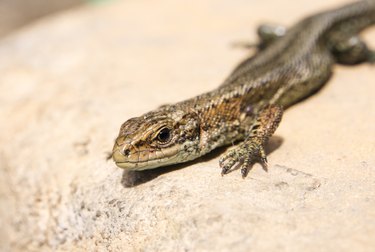
When you live in a warm climate, it's common to have problems with lizards. These scaly invaders in the yard and home can be a nuisance. If you want to repel lizards, you might wonder if it's possible to use mothballs.
Years ago, it might have been acceptable to use mothballs as a lizard repellent, but that recommendation has changed. Today's mothballs are made of the active ingredient naphthalene or paradichlorobenzene. Both change into strong chemical gases that can be harmful if inhaled.
Video of the Day
Video of the Day
Proper Use of Mothballs
Mothballs are considered a pesticide, as they are designed to kill moths that harm clothing and other textiles. It's important to carefully handle mothball products and use them as instructed. Generally, you place the mothballs in airtight containers with clothing and other materials. The chemicals in the mothballs then turn into a gas that kills the moths and their larvae.
When containers with mothballs are sealed and airtight, people and pets are generally protected from the gas. When the gas is released into the atmosphere, though, as would happen if you used mothballs as a lizard repellent, it can be harmful to anyone breathing the vapors. If you smell mothballs, you are likely inhaling chemical pesticides.
Symptoms of mothball exposure include eye and nose irritation, coughing, headache, vomiting, nausea, and diarrhea. Long-term exposure can lead to serious health problems, like kidney and liver damage.
Rather than risk the health of your family, your pets, and yourself, it's possible to repel lizards using nontoxic methods. Here are some good options for naturally repelling lizards.
Eliminate Food and Water Sources
Lizards are like any pest. They look for food and water to survive. Use common pest exclusion tactics. Eliminate access to food sources, like trash and compost. Use sealed trashcans and make sure to dispose of food waste on a regular basis. Also ensure that you don't have any leaks around your home, as excess water causes puddles that may attract lizards.
Seal Entry Points
If lizards have a way into your home, they will take it. Make it especially difficult for lizards to enter your house by discovering how they are entering. When looking for entry points, consider that lizards are flexible and able to squeeze into and through small spaces. Fill holes and cracks surrounding windows with caulk or recaulk. Install weatherstripping on the sides of doors and windows and fine wire mesh over other entry points, like vents.
Use Natural Lizard Repellents
Natural repellents provide a safe, nontoxic way to rid your home and yard of lizards. Such deterrents consist of strong-smelling substances that lizards don't like, such as cayenne pepper and hot sauce or Tabasco sauce. You will also find ready-to-use repellent solutions in home and garden stores.
Prepare homemade deterrent solutions by mixing several tablespoons of the strong-smelling ingredient with a pint of warm water. Mix prepared commercial solutions as indicated on the package directions. Spray the mix throughout areas where lizards have been a problem. This includes the perimeter of your home and around entry points, like windows and doors.
Grow Plants That Repel Lizards
A variety of plants emit strong odors that tend to keep lizards at bay. These include peppermint and eucalyptus, which each have a unique, powerful odor. Grow these plants near areas where lizards congregate in your yard. In addition to planting deterrent species, keep your landscape tidy, as lizards like to hide and live in old vegetation.